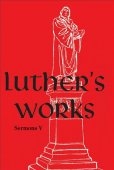This volume contains a selection of Luther's preaching from between January 1539 and his death in 1546. Aware of his own mortality and deeply committed to the proclamation of the Gospel in the last days of the world, Luther preached during these years with a special sense of urgency, seeking to make a final confession and testament of his teaching and to issue a public rejection of its opponents. In that effort, he returned frequently to theological themes from the early years of his public career and to autobiographical reflection, working to convey the significance of the Reformation to a new generation ignorant of the circumstances that had called for reform, who had experienced ''nothing of these distresses and heartbreak under the pope and what a joyful thing the Gospel is.''
The recent expansion of the Reformation to previously hostile territories and cities provided Luther, despite his health, with opportunities to travel and to preach to newly Evangelical communities, expounding the basic elements of his theology. In these sermons, Luther emphasized catechesis in the heart of the Gospel as he understood it, but he was also concerned with warning against a return to old abuses and with encouraging the new organization and support of Evangelical clergy and schools to ensure the survival of the Reformation.
In his ongoing preaching in Wittenberg itself, Luther was intensely concerned with the life and welfare of the congregation with whose life he had been most intimately involved. In addition to preaching on the broader theological conflicts with which he dealt in his published treatises, Luther dealt with local tensions--which culminated in his own brief, self-imposed ''exile'' from Wittenberg in the summer of 1545. He defended his own role within and responsibility for the Wittenberg church and dealt concretely with the Antinomians' rejection of the Law for Christians by assiduously preaching both the Law and the Gospel to the congregation. When, as it often did, the life of the Wittenbergers seemed to fall short in both good works and faithful devotion, Luther could be uncompromising and unrestrained in his admonitions, whether in denouncing the university jurists who sought to reimpose the standards of papal canon law or in rebuking the Wittenbergers for immorality and, especially, for their greed.
Nevertheless, even Luther's most bitter complaints about Evangelical congregations do not suggest that the old reformer had fallen into despair. His admonitions to faithful hearing of the Word and amendment of life appear alongside his confident declarations that, in fact, the Gospel was being faithfully taught. Luther boasted that the Gospel was being preached and proclaimed, not only in the churches by faithful pastors, not only in the schools, but also in homes, among parents and children, as he says in his last sermon: ''You hear [God's Word] at home in your house, father and mother and children sing and speak of it, the preacher speaks of it in the parish church.'' The Gospel is thus communicated from one generation to the next, from parents to children--and also back again, from children to parents. It is to the children, learning the Catechism, that Luther refers adults who have questions about Christian faith, and upon the youth, ''the seedlings with which the Church of God, like a beautiful garden, is cultivated and propagated,'' that the reformer continues to place undiminished hopes. These sermons thus bear witness to Luther's understanding that the Reformation is neither an accomplished, once-for-all event nor a step along the progressive way to the full purification of the Church, but a continual struggle, carried out through the preaching of the Law and the Gospel, to be renewed from generation to generation until the Last Day.


